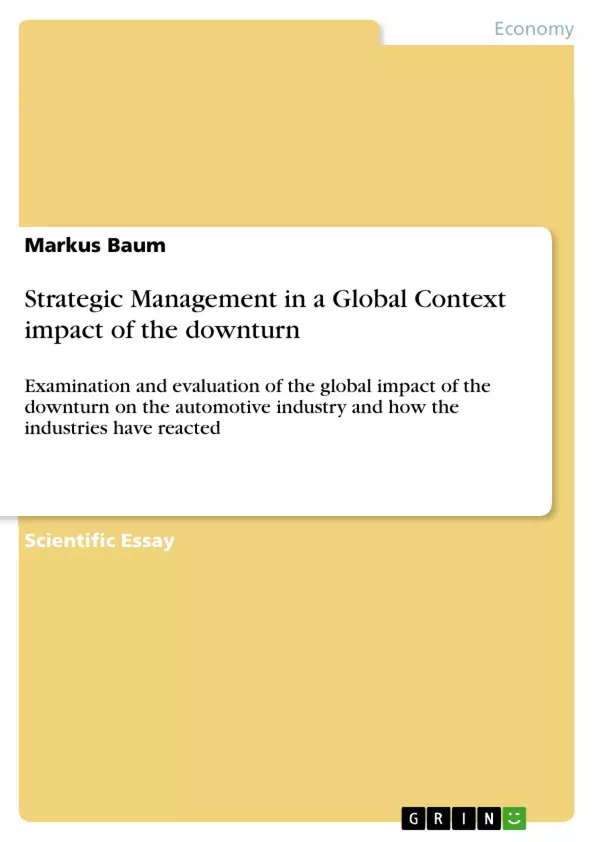ABSTRACT & CONCLUSION
The current recession, arising from a real estate crisis in the US and followed by a global financial crisis, has affected industries differently around the world. The automotive industry decreased by 15% globally in production of cars and light commercial vehicles (VDA, 2009) as result of the downturn. Lot of companies were supported by the government directly or indirectly. Obsolete structure of the industry and high overcapacity are the main problems. The assessment in this paper examines and evaluates the global impact of the downturn on the automotive industry and how the industries have reacted.
BMW, one of the ten largest car manufacturers worldwide, operates experienced a 10.4% loss in sales in relating to the previous year as result of the recession and decrease in demand in the automotive industry. The reaction to it was for example less investment in to R&D and redundancies. Almost all resources, capabilities and competitiveness of BMW were concerned. The extent to which the downturn affected those will be examined and evaluated in the second part of this paper.
The most important future trends in the automotive industry will be “green technology” and “changing in customers demand”. Capacity optimization will be important to win the competition. BMW is recommended to penetrate the market with its successful products and to invest in R&D to follow and setting industry trends. The third part of this paper provides perspectives and recommendation for the industry and provides strategy recommendations for BMW.
ABOUT THE AUTHOR
Markus B. Baum, MBA
Markus Baum is Group Finance Director at a management consulting firm with focus on business strategy, supply chain management (SCM), manufacturing & logistics, sourcing & purchasing, marketing & sales, financial management and information technology (IT-strategy). The company has subsidiaries in Germany, Switzerland, Belgian, France, United Kingdom and Russia.
Markus Baum earned a MBA with distinction from the University of Surrey (UK), is an international certified accountant, has and graduation in accounting & controlling and an apprenticeship as tax adviser assistant. Markus Baum is a member of the International Controlling Association.
Inhaltsverzeichnis (Table of Contents)
- Abstract & Conclusion
- Industry examination and evaluation
- The global downturn - summary of the important events
- Impact onto the automotive industry - PESTEL Analysis
- Reaction of the automotive industry - Porter's five forces
- Company examination and evaluation
- BMW AG - company profile and current performance - SWOT Analysis
- Impact of the global downturn onto the company
- Value chain analysis
- Impact on resources, strategic capabilities and competitiveness
- Recommendation
- Perspective and recommendations for the automotive industry
- Evaluation of strategic directions and recommendations for BMW
- Portfolio screen - McKinsey Matrix
- Product and market growth strategy - Ansoff's Product-Market Growth Matrix
Zielsetzung und Themenschwerpunkte (Objectives and Key Themes)
This paper aims to examine and evaluate the global impact of the downturn on the automotive industry and how the industries have reacted. It focuses specifically on the case of BMW, one of the world’s largest car manufacturers.
- The impact of the global economic downturn on the automotive industry
- The reaction of the automotive industry to the downturn, including strategies and tactics employed
- The impact of the downturn on BMW's performance and competitiveness
- Recommendations for the automotive industry and BMW to address the challenges posed by the downturn
- The role of green technology and changing customer demand in the future of the automotive industry
Zusammenfassung der Kapitel (Chapter Summaries)
The first chapter provides an overview of the global downturn, highlighting its impact on the automotive industry. The second chapter examines the global downturn in detail, exploring its impact on the automotive industry through PESTEL analysis and Porter's five forces. The third chapter focuses on BMW, examining its company profile, current performance, and the impact of the downturn on its operations. It also includes a value chain analysis and explores the impact on BMW's resources, strategic capabilities, and competitiveness.
Schlüsselwörter (Keywords)
The key themes and concepts explored in this paper include industry examination, global downturn, automotive industry, PESTEL analysis, value chain analysis, resources, strategic capabilities, competitiveness, strategic directions, portfolio screen, McKinsey matrix, growth strategy, Ansoff's Product-Market Growth Matrix, BMW, strategic management, global context, impact of the downturn, Real estate crisis, Financial crisis, green technology, SWOT Analysis.
Frequently Asked Questions
How did the global downturn impact the automotive industry?
Global car production decreased by 15%, leading to high overcapacity and the need for government support in many countries.
What was BMW's reaction to the recession?
BMW experienced a 10.4% loss in sales and reacted with redundancies and reduced investment in research and development (R&D).
What is a PESTEL analysis in the context of this paper?
It examines the Political, Economic, Social, Technological, Environmental, and Legal factors affecting the automotive industry during the downturn.
What are the future trends for the automotive industry?
Key trends include "green technology," changing customer demands, and the necessity for capacity optimization.
What strategic tools are used to evaluate BMW?
The paper uses SWOT analysis, Value Chain analysis, the McKinsey Matrix, and Ansoff's Product-Market Growth Matrix.
- Quote paper
- Markus Baum (Author), 2010, Strategic Management in a Global Context impact of the downturn, Munich, GRIN Verlag, https://www.grin.com/document/193817



